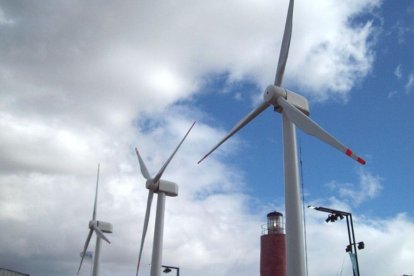Biden Administration imposes new windmills on the Oregon Coast
The President's decision was made even though neighbors complained that their views on the project were not heard.

Áreas de energía eólica | Wikimedia Commons (Sergio Panei Pitrau)
The Bureau of Ocean Energy Management (BOEM) announced the designation of two Wind Energy Areas (WEA) off the Oregon coast. The WEAs cover about 195,000 acres and offer a potential 2.4 gigawatts (GW) of energy.
"In support of the Biden-Harris administration’s goals for deploying 30 gigawatts (GW) of offshore wind energy capacity by 2030 and 15 GW of floating offshore wind energy capacity by 2035, the Bureau of Ocean Energy Management (BOEM) today announced the designation of two final Wind Energy Areas (WEAs) offshore Oregon," the office explained in a statement published on its official website.
"BOEM values its close coordination with the State of Oregon as we continue to work together to maintain a robust and transparent offshore wind planning process," said BOEM Director Elizabeth Klein.
Citizens ‘ignored’
The federal government's decision came despite the fact that residents reported that their considerations regarding the installation were not heard. Jen Hamaker, president of Oregon Natural Resource Industries (ONRI), explained to Just The News that although meetings were held between the community and the Bureau of Ocean Energy Management, they were not allowed to express their opinion.
They were "supposed to be public meetings where we can give public comments and or ask questions, but they didn't allow that to happen. … They have to hold these public meetings, but that doesn't mean that they're actually coordinating with local governments or with local people or with anything. They’re just telling us how they're going to do what they're going to do," Hamaker said.
The dark side of wind energy
In addition, the Democratic government is leaving aside the consequences that green energy can have. There are more and more studies that show the negative effects that current renewable energy sources have on the planet. Following reports showing that wind farms increase the earth's temperature, several experts have reported that the installation of windmills at sea is causing a dramatic increase in whale and dolphin deaths off U.S. coasts.
Additionally, a 2018 study found that if the U.S. installed enough wind turbines to cover all of its energy demand, the country's air temperature would rise by 0.43 degrees Fahrenheit on average by 2030. Paradoxically, this is similar to the temperature increase predicted for that year in the area adjacent to the country as a result of greenhouse gases. Eliminating all fossil fuels, however, would barely reduce the national temperature by 0.18 degrees in the same period of time, according to the analysis by Harvard scientists Lee Miller and David Keith.












